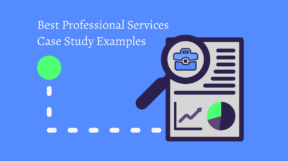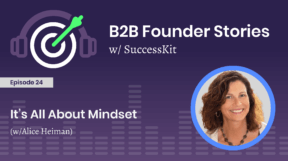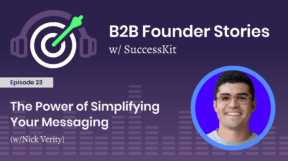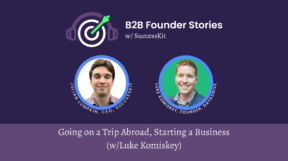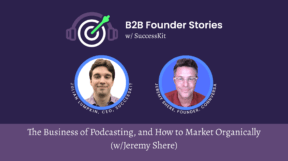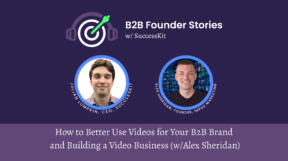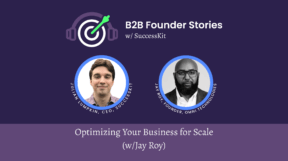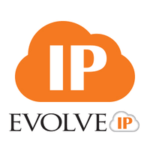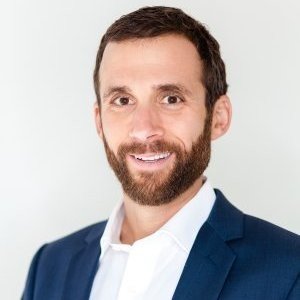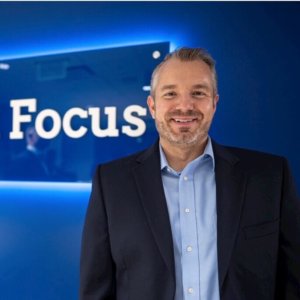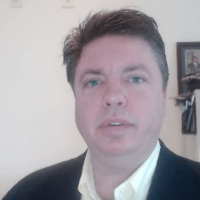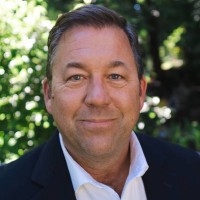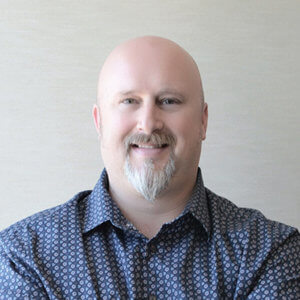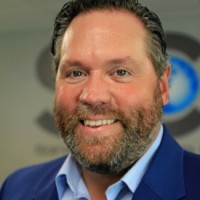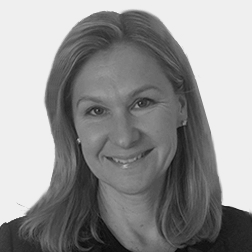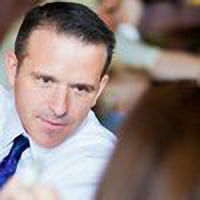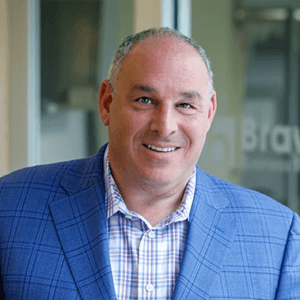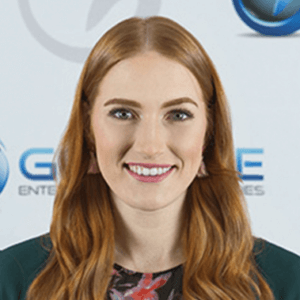Listen to this episode now on Spotify or Apple!
In the eighth episode of our B2B Founder Stories podcast, Eric Gunderson, the CEO of the performance marketing agency High10 Digital, shares how his business came close to $1 million in revenue in just its second year. He also notes how the COVID-19 pandemic helped the company resonate better with its target audience and that it’s necessary for businesses to constantly research new ways to market themselves. But above all, he cites the importance of listening to and serving one’s clients.
“Every business that I’ve started has really been very focused on how to help my clients achieve their business goals. Not try to tell them what their goals should be, but listening to what their very real objectives are, and then trying to strategize ways to help them get there… You have to really care about your clients… If we know in our hearts that our job is to really help someone, that we are in a service industry, that we’re really there to help, we can’t fail, and the client will feel that.”
Eric Gunderson, High10 Digital
Transcript of Podcast Episode 8: Helping His Clients Set Goals Earned His Company $1 Million in Two Years (w/Eric Gunderson, CEO of High10 Digital)
Julian Lumpkin: Welcome back to B2B Founder Stories with SuccessKit. My guest today is Eric Gunderson from High10 Digital. I was excited about this interview because Eric has started a number of marketing agencies, but his current agency has grown really quickly. As you’ll hear, he’s been able to turn his business into a seven-figure business by year two, and continues to grow. So I wanted to interview him about his approach to running this business, how it was different from other businesses that he started, and why it’s been so successful. I hope you enjoy the episode.
Julian Lumpkin: Eric, thanks for joining us. To begin, can you quickly tell us about High10, what you do as a company?
Eric Gunderson: Sure. At High10, we’re a performance marketing company. And what that means for us, is that everything that we recommend to our clients has to have some sort of measurable result attached to it. Our name kind of speaks to us being a digital company, but what that really means to us is that we tend to put together strategies and tactics, that allow us to be able to show a measurable result, whether that be in a direct sale or just showing that we are having conversions with our clients. And that’s the important part of what we’re doing in performance as well. It’s not just about clicks or impressions. It’s really hardcore, what we can do to help our clients achieve their business objectives.
Julian Lumpkin: Nice. Can you give our audience a sense of the size of your company, in terms of revenue, employees, how long you’ve been around?
Eric Gunderson: Sure. Right now, we have seven people on the team. We would love to have more. We could really use two to three or maybe even four more people, so we are actively looking for folks to hire in some positions. We’re in our fourth year. First year revenue was around 350,000, second year, we were over 700,000. Last year, we hit 1.3, and this year, we are shooting to crack two, and on pretty good pace to hit that goal.
Julian Lumpkin: Yeah. So those are some really fast growth numbers for a company so early. What do you think allowed you to get off the ground so quickly with your company?
Eric Gunderson: I think for better or for worse, COVID sort of helped our business philosophy resonate better with our target audience. What we’re about is really very high touch service, that allows us to take a deeper dive into our clients’ opportunities. We’re constantly updating market research on industry trends, trends within target markets, trends within competitors for our clients. That’s information that we’re constantly updating with our clients, on a monthly basis.
Eric Gunderson: So that’s a service that is attractive to a lot of people, because they’re very interested in data. And they’re very interested in keeping up with these trends, because they don’t really have time to do it in the course of their daily life. But before COVID, it was kind of, well, that’s a nice service, but I’m really pretty busy going to trade shows, or I’m committed to some of the things I’m doing with outdoor or television or whatever the media might be.
Eric Gunderson: When COVID happened, some of the people that we were talking to, suddenly they weren’t going to trade shows anymore. And they really couldn’t have the phone ringing off the hook because they couldn’t really address the business coming in. They viewed our service as a good gap. This is our opportunity to do some research and consult with these guys.
Eric Gunderson: And so we were able to pick up some new business during COVID, during 2020. 2021, we were able to retain those clients and also started getting referrals from those clients. At the start of 2022, we retained those clients and were able to increase our asking from them, and continue to get more referrals. So I think the service itself makes sense. People are starving for data. They don’t really know how to get it or what to do with it once they do have it. And that’s our primary focus, is helping our clients be efficient in getting to their business objective as quickly as possible. And that’s just become increasingly important, I think, now with what’s happened in the world over the last two and a half years.
Julian Lumpkin: It’s really interesting, and in a way, related to something I’m thinking about, so I’m curious to hear your perspective on this. Because my company too, when COVID hit, a lot of companies started moving budget from trade shows to digital assets, like case studies. What I’m curious for your perspective on is, how permanent these changes that COVID brought about will be? Do you expect, let’s assume things with COVID keep going well, and the end of 2022, events are back, going into 2023, things are more normal in the business world. Do you think businesses are going to go back to the way that they were thinking previously, or do you think these changes are more permanent?
Eric Gunderson: Well, I think that it’ll be somewhere in between. People are starving to get back out and attend those events, but I do think that some of the strategies and tactics that some businesses invested in before, they’re going to be a little bit more cautious about doing that. And they can be, because the technology that’s out there right now, allows us to be a lot more targeted with our message. So we don’t necessarily…There are very few businesses in the world, that can afford to necessarily blast out a message or a campaign to the masses. Everybody wants to be very granular in their approach to targeting the people who are most likely to be interested in their product or their service. So that’s what we do, is we’re not so much interested in how we can have our client have a 10%, a 100% more clicks to their website each month, or a whole lot more form fills, or the phone ringing off the hook.
Eric Gunderson: Most of our clients, they don’t have time for that. They don’t need the phone ringing off the hook. They need the people that they’re talking to, that they’re spending their time talking to, they need those to be quality leads for them, that they can really take a deep dive and move them through their sales funnel as quickly as possible.
Eric Gunderson: So I think people are realizing that there are opportunities out there now, to be more efficient in their approach to marketing. But like I said, there are things that people are going to want to do to get back to. I think trade shows is actually a great example of that, but there are other mediums, I think that people are going to shy away from, and hopefully keep coming to us to look for the avenues that can help them get to where they want to be, as quickly as possible.
Julian Lumpkin: Interesting. And last question on this topic, as the CEO of the company, do you think of potentially sort of adjusting the way that you sell and market your own service, based on these kind of bigger trends, or do you take the approach of, this is what we’re doing and it doesn’t matter what happens out there. We’re going to keep doing it?
Eric Gunderson: No. We’re constantly looking for new ways to market ourselves. We’re listening to our clients. We want to understand what it is that they most appreciate about what it is that we do. And obviously, we’re listening to our best clients who appreciate the service we provide the most, and we want to find more people like that.
Eric Gunderson: The challenge for us that we’ve learned here, really in the last year with things opening up a little bit more is, we’ve attended a couple of events and been very successful at those events. We have opportunity to tell our story, despite some of the recommendations that we’re making to our clients, not all those strategies and tactics work for us. We’re a service company and one of the strengths of our company is our high touch philosophy and our client service.
Eric Gunderson: Everybody talks about client service, so is it really that believable, if you’re out there putting out messages on search engines or on banner ads saying, Hey, come to High10, we care about you more than everybody else. Nobody’s going to believe that in an ad. But when we have the opportunity to talk to folks, give them our own case studies and tell them how we understand their pain, and how it is that we help our clients to alleviate those pains, then they get it.
Eric Gunderson: They recognize our service as something unique, and that’s been successful for us this year. But we didn’t realize how important that was to us, until we had the opportunity to go to events. Events shut down shortly after we started our business. So we’ve been going through some other digital channels, had limited success with those, but now we learned that this is a good thing for us and we need to attend more events. But I’m hoping that we’ll find some more avenues here, maybe tomorrow, maybe today. Maybe this will be our new avenue that helps us to drive the appropriate new opportunities for us. So, yeah, just like we’re always looking for opportunities for our clients, we’re looking for unique ways to bring us the clients that we want, so we can achieve the growth that we’re looking for as quickly as possible as well.
Julian Lumpkin: Nice. So I want to rewind back to actually, before you even started the company, we didn’t get to your own background in the beginning, as we normally do. This is not the first business you’ve started, so can you give us the very quick overview of what you were doing before High10, some of the businesses you started?
Eric Gunderson: Sure. Unfortunately, I can now say I’ve been in marketing for almost 30 years now. So I’ve been both on the agency side and the client side, and I’ve taken those experiences to look at what I think is most important. I understand how traditional agencies work, and I also understand what businesses are looking for, which is looking at that profit and loss and the bottom line.
Eric Gunderson: Every business that I’ve started has really been very focused on how to help my clients achieve their business goals. Not try to tell them what their goals should be, but listening to what their very real objectives are, and then trying to strategize ways to help them get there. So, right before I started High10, I actually had another digital marketing company, that was primarily focused on search engine optimization and digital advertising.
Eric Gunderson: But the reason that I broke away from that to start High10, was because I recognized that our clients, while they enjoyed the results that we were giving them, we were giving them exactly what they asked for. They were telling us keywords, where they wanted to rank, and we were doing that, but I knew that there was a lot more that we could do. We were basically following orders and doing what we were told. With High10 now, we’re assuming more of a leadership position, where rather than just looking at the keywords that they tell us they want to rank for, we’re looking for those trends and helping to identify new opportunities, new revenue streams, new ways to get them to that goal faster. And I recognize that was a gap in the old business.
Eric Gunderson: When we started High10, we hired more experienced individuals with business backgrounds, who could identify those things. So I’ve always, across the course of my career, from starting my first sort of traditional agency, to moving into a consulting role, with independent physicians and dental practices, I had a magazine that was geared towards those doctors and dentists. And then you could see digital coming and then I moved into the digital side, and then that led me into where I am now with High10.
Julian Lumpkin: Got it. So clearly, when you started High10, you were far from a first time entrepreneur and really had a real plan in place. I want to dig in to what allowed you to grow so quickly. So when you started, did you immediately bring on a full-time team? Did you have some partners in mind? How did you get from, I think you said 350 K in year one, and close to a million in year two? What did that look like in terms of employees? What did you do to get this off the ground so quickly?
Eric Gunderson: Well, it was starts and stops. I brought over one of my former employees, at my previous business, after I sold that to my partner. I brought one of the employees over. She actually is a partner in the business with me. We started going out there and looking for a couple of new people to hire, had some success, had some failures, so got in and out pretty quickly.
Eric Gunderson: We were also able to bring a few of our clients over from the old business. I had identified some clients that I knew would appreciate a deeper level of service, than what we had been providing previously. Like I said, we were able to grow that business and had relationships with them, that they were comfortable referring other people that they know were having similar challenges, or had similar goals and said, Hey, you should really talk to these guys. This is what they’ve done for me.
Eric Gunderson: Again, it goes back to the client service experience with us. We really do a deep dive. We assume a consultative or a coaching approach. I don’t want to say that we’re business coaches or business consultants, but that is a big part of what we’re doing. We’re helping them take a deeper dive into the opportunities that exist. We’re presenting that information in bite size bits, that they can actually take that information and do something with it.
Eric Gunderson: It’s not a large marketing plan, or a large market research project that takes six weeks to put together. And then you have to sit and try to figure out, Hey, this is great information, but what can I do with this? I don’t have the time to do anything with it. We’re giving them information that they can actually use. So I think that the clients felt that it wasn’t just, again, them giving us direction and us just following it, and not really knowing what the output was or what the results were.
Eric Gunderson: It really became more of a, bring us new ideas and help us figure out how to really get to where we want to get to. Our clients realize, as we do in our own business, they don’t have all the answers and they’re looking for help. And the service that we’re providing is something that gives them the opportunity to really focus on their business for an hour or so, a month, and then giving them things that they can actually implement and see the results.
Julian Lumpkin: Interesting. So changing gears a little bit, I want to ask some questions, just about the landscape and just advice for some entrepreneurs. But let me start with this. Compared to previous times, and we can say 10 or maybe 20 years ago, do you think it is easier now to start and operate a marketing agency, or harder now to start and operate a marketing agency
Eric Gunderson: From the standpoint of starting a business, any business, it’s easy to start any business these days. You can obviously start a business just with a phone or throw up a website in an hour and a half. So it’s easy to start any business these days. In terms of being a successful, long running business, it’s hard for me to say that it’s any harder or easier. There are certain aspects or a certain personality that it takes to be successful.
Eric Gunderson: And what I’ve been really been paying attention over the last 20 years, businesses that I’ve seen start and fail or businesses that have succeeded, or businesses that have sort of gone along and haven’t really seen any major fluctuations, up or down. I think the consistency is, you have to really care about your clients. And I know that sounds cliche, but the businesses that seem to be really all about, how can I build my client as much as possible, and are very shortsighted on how can I complete this project and make as much money as possible, and not looking to try to create a long term relationship out of that opportunity, or think about the referrals that could come from that.
Eric Gunderson: That’s something that I’ve seen over the years. And that’s always been our philosophy is, it’s not always about the money. I mean, we’re in business to make money obviously, but also, if we can really help that client. I tell my employees all the time that, don’t think about trying to sell somebody something, or don’t be concerned about a client being upset about something that we’ve tried, that doesn’t work.
Eric Gunderson: If we know in our hearts that our job is to really help someone, that we are in a service industry, that we’re really there to help, we can’t fail, and the client will feel that. And I’ve just seen a lot of businesses over time, that it’s very clear that it’s all about the money upfront, and that tends to not work in the long run, in my experience. The other consistent thing I [inaudible 00:18:54] is about money, is that a lot of times, in the marketing world, people will start a business because they’re frustrated with the way that things were done someplace where they worked, or they have great ideas or they’re very creative, and they have a lot of talent.
Eric Gunderson: But at the end of the day, you have to make sure that financially, you’re taking care of business and that you surround yourself with people that will help you make sure that the top priority is making sure that your invoicing goes out on time, that you’re collecting the money, that you’re depositing it, that you’re budgeting to make sure that you have enough money to take care of your people, and to be able to invest when the opportunities come about.
Eric Gunderson: There’s a lot of people that don’t do that either. So it’s pretty basic. Those aren’t necessarily specific to marketing, but I feel like if you follow those basic principles, you can be successful. At the very least, it’ll buy you time to figure things out, and add more ideas or services or opportunities to that basic idea that you started the business with.
Julian Lumpkin: Yeah. So you bring up a point that I’m always very interested in, which is client management from an agency perspective. There’s this real fine line to walk, where I think most of our audience know, and you know that if you say the client is always right, and just do whatever they say all the time, you’re going to get walked all over. And at some point, you’re going to be taken advantage of. At the same time, you need to be, like you keep saying, a really client first focused company.So can you talk to us about how you find that balance of being client focused, but making sure that you and your team aren’t getting taken advantage of in any way?
Eric Gunderson: Well, I think that’s been really the most rewarding thing about this latest experience for me with High10. Because in a service industry, you’re kind of at the mercy of your clients, in most of those relationships, where they’re the ones who are in their business every day. They’ve been doing it for years and they’re going to tell us, this is the goal. This is the way we’re going to get there, and this is what we need you to do.
Eric Gunderson: With what we do at High10 now, we’re very agnostic with the information that we’re pulling for our clients. So we have the opportunity to bring them information, where they may have been talking to their clients the same way for the past 10, 20, 30 years, but there are new trends and we can see what people are looking for, and we can see the language that they’re using. The way someone’s looking for a particular product or service in Wisconsin, isn’t necessarily the same way that they’re searching in Louisiana.
Eric Gunderson: They shouldn’t look at it holistically. This is the message that we use, because this is what we’ve done for a long time. We’ve been able to help our clients sales representatives to be more efficient, and to connect more quickly with prospects, that they couldn’t get their foot in the door for years. And it’s been very interesting for us to, even some cases, help our clients to create entirely new product lines, just based on things that we’ve seen that their competitors are doing.
Eric Gunderson: So it hasn’t always been this way in my career. In fact, the vast majority of my career has been following direction, making suggestions, but ultimately, having to rely on the client’s experience. With what we’re doing now, and the amount of information that’s out there, if you have the time and you know how to search for it, and you have the tools to help you disseminate good information or good data from bad, we can help our clients to understand that there might be a different and better way to do business. And I think that’s what our clients have really appreciated about us.
Eric Gunderson: Not everyone’s going to want that, right? Some people just want you to follow orders, but the clients that we’ve been really successful with, and I think the reason that we’ve been able to grow quickly, is we’ve been able to help our clients grow quickly. And as a result of that, they’re willing to invest more in the service that we’re providing. Being in the service industry is tough. At the end of the day, we are supposed to be there for the client, but we’re always very upfront in our relationships, that our goal is your goal.
Eric Gunderson: If you tell us you want to increase sales by 5% by the end of this year, we’re going to see how we can get you there in nine months. And we’re going to tell you what we think you should do in order to get there. Our relationship isn’t based upon just taking work off your plate, that you don’t have time to do. It’s based on a partnership that we’re all going to see success at the end of the day.
Julian Lumpkin: What are your long-term goals for High10 like, what would be the perfect outcome for you in, let’s say 10 years?
Eric Gunderson: Well, I turned 50 this year, and so my goal with this business, is by the time we turn 60, which in 10 years, is that we’re a $20 million business. It’s an aggressive goal, but the way that we’re progressing right now, we think it’s doable. We’re going to be working with larger clients who want to invest more in the entirety of the service that we have, and we’re looking to add more services as well.
Eric Gunderson: As long as we can continue to find good people to bring in, that care about our clients and the success of the business, and not just thinking about checking in and out 9:00 to 5:00, if we can bring those people in and create the team atmosphere that we’ve been successful doing so far, I feel like it’s a very attainable goal for us.
Julian Lumpkin: I’m trying to kind of do some math in my head as we speak, but do you happen to know, or have a kind of set… What does that growth rate look like to get to $20 million in 10 years? Do you see that kind of linear growth? Can you talk to me about how you imagine that happening?
Eric Gunderson: I mean, really a lot of it is going to be in the business development side. We’ve had clients who have successfully been referring business to us. We’re going to be out there trying to talk to more of the right types of businesses, who we believe are going to be a good fit. It’s not really about an industry for us. It’s really more about a philosophy, and finding people that appreciate and really need the services that we provide.
Eric Gunderson: We’re in a growth mode where we started working out with some smaller businesses, but we’re all over the place. We’re working with startups and we’re working with Fortune 50 companies now. And if we think that the mindset and the philosophy matches the service that we’re providing, so it’s appreciated and people want to invest in that and really see us as an extension of their team. We’ve had success with that attitude so far, and we believe that’s how it’s going to grow.
Eric Gunderson: It’s getting the message out there and meeting people. There’s no silver bullet. Again, we’re not going to be able to just invest in pay-per-click advertising, and expect people to be calling us. Again, we don’t need the phone to be ringing off the hook either. We have to be strategic in our growth, and we’re looking for the right sort of people who want to invest with us.
Eric Gunderson: Again, as a performance marketing company, another thing that we’re doing right now, that we feel is unique, although I don’t think it’ll be unique in another five years, is with a lot of our clients, we’re giving deep discounts on the retainer side of the business, in order to invest in their success. Basically taking a commission with sales that we bring to the table. So there’s skin in the game on our side, and we think this is going to be…
Eric Gunderson: There’s a lot of risk there with us, but I think that’s going to be a more comfortable way for businesses going forward. In the clients that have invested in that relationship with us so far, it’s been successful.
Julian Lumpkin: Nice. So I want to give my audience a clear picture of what it’s like to be a successful entrepreneur, running a growing business. So you can keep these answers pretty brief. I’m going to give you some rapid-fire ones about your day-to-day, but what are your general working hours?
Eric Gunderson: Yeah. I’m a dad and I’m an involved parent. So in general, it’s from 8:00 to 5:00 on a daily basis. I used to spend a lot of time in the evenings, doing work. I’ve decided to reserve that time primarily for the family. Sometimes you have to jump in. I also am a bit of an insomniac, so I find that if I can turn the computer off by 10 o’clock, that I sleep a lot better. So I’m paying more attention to my health now, than I did maybe in my earlier years, starting a business.
Eric Gunderson: I see a lot of people who talk about working 60, 70, 80 hours a week. I don’t feel like that’s necessary for every business. Again, I try to surround myself with good people who really care about the business. In my career, before I started my first business, it was never about my title or how much money I was making before I had kids and other responsibilities. It was always about helping my clients succeed and feeling successful myself.
Eric Gunderson: I’m trying to find people who feel that same way, and want to take personal pride in a client’s success and grow with us. So a lot of it again, is about hiring the right people, surrounding yourself with good folks, but as an entrepreneur, as a business owner, you don’t really have hours, but I try as best as I can to reserve my focus on the work between 8:00 and 5:00, so I can give my time and attention to my family after that.
Julian Lumpkin: Nice. And as part of your workday, what are the main things that you, as the founder and CEO of the company, focus on now?
Eric Gunderson: We’re a small business, so we don’t have a sales staff. I am the sales staff. So I have hired a colleague who has the same amount of experience as do I. He’s the chief operating officer, and so he handles a lot of the day-to-day items and working with the rest of the team. And then that allows me to focus a little bit more on business development. That’s where I’m really trying to put most of my time. Unfortunately, there are a lot of administrative tasks that cut into that on a day-to-day basis.
Eric Gunderson: This week, I had to spend three hours working on an insurance audit, and those are just the sorts of things you have to do when you’re a business owner for a growing small business. So I would say that I’ll typically spend… And I try to map out my hours daily, but I’ll typically spend about three hours on business development, another three hours on administrative tasks. And then usually two to three hours on specific client tasks.
Julian Lumpkin: Are there parts of the business or parts of the service that you provide, that you’ve explicitly removed yourself from?
Eric Gunderson: Unfortunately, no. I’m trying. I am trying, but again, I’ve been running my own business for a long time. Some things are hard to get away from. The money is a hard thing to get away from, because I’m always worried about making sure that everything is coming in the way that it should, and that we’ve got money ready to invest in new people and new technology. And that I’m taking care of my employees and keeping them feeling fulfilled on that end.
Eric Gunderson: But I’ve done a better job this year. We’ve outsourced our accounting to a controller. My COO is more involved with helping me out with the billing. So I’ve tried hard to make that less time consuming for me on… Not a daily basis, but certainly on a monthly basis. And also, just the interaction with the team. I’ve always wanted to make sure that their voices have been heard. We work on a pretty horizontal structure.
Eric Gunderson: And again, I know I don’t have all of the answers and I’ve got a team of really smart, engaged individuals, but I don’t always have time to have long conversations with them. So again, my COO is meeting with each of the team members on a weekly basis, to hear how things are going and to get at new ideas. We’ve moved people around to take on more of the responsibilities with media opportunities.
Eric Gunderson: Someone who’s doing more of kind of keeping a temperature on all of our clients, to make sure that they’re happy. Never satisfied, but happy with the service that we’re providing. So again, some of the day-to-day check in things, I’ve been able to, not completely divorce myself from, but I’m getting a lot more help. Again, I have a great team of people that I trust to take care of those things. And that’s the key, is hiring and making sure you hang on to people that really care about the business and the clients, and want to grow with you.
Julian Lumpkin: Couldn’t agree more. And I think that’s a good place to end. Eric, thanks so much for joining us and sharing your story.
Eric Gunderson: Thanks for the opportunity. It’s been fun.
Julian Lumpkin: Thanks for listening. We’ll see you back here soon for our next episode.
Conclusion
Subscribe to the B2B Founder Stories podcast on Spotify and Apple and never miss an episode!
If you have an idea for a future topic you’d like addressed or if you’d like to be a guest on the series, contact Julian via the form on our Learn More page.




